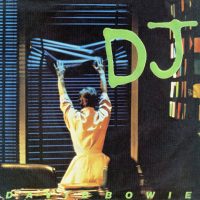 Written by: David Bowie, Brian Eno, Carlos Alomar
Written by: David Bowie, Brian Eno, Carlos Alomar
Recorded: September 1978, March 1979
Producers: David Bowie, Tony Visconti
Released: 25 May 1979
Available on:
Lodger
Personnel
David Bowie: vocalsCarlos Alomar, Adrian Belew: guitar
Simon House: violin
Brian Eno: synthesizer
George Murray: bass guitar
Dennis Davis: drums, percussion
‘DJ’ was the second single released from Lodger, David Bowie’s 13th studio album.
This is somewhat cynical, but it’s my natural response to disco. The DJ is the one who is having ulcers now, not the executives, because if you do the unthinkable thing of putting a record on in a disco not in time, that’s it. If you have thirty seconds silence, your whole career is over. The most absurd thing about this is that I was with John Cale in New York and I played his viola on stage at Carnegie Hall. He called me and asked me to play at a benefit for a radio station in New York. I had never played viola in my life before, but I learned four notes on it and it sounded great. I may learn another four and play it on my next album.
Melody Maker, 19 May 1979
Upon the album’s release, Bowie revealed that the DJ in the song worked in a disco rather than a radio station.
It was just a sort of a kind of pastiche thing that one thinks up in a disco, really. You look at the DJ and wonder what he does, or why he became a DJ. This sort of lone creative spirit up there in the box. It was very much the dance floor DJ as opposed to a radio DJ. And I figured this one as being a reluctant viewer, he’s sort of a little bit angry that he got thrown out of his other job, and his greatest and most thrilling experience in life is being able to watch his ex-boss dance on the floor beneath him, and he can control the speed and the tempo of the music.He has to be so finely tuned in to the atmosphere on the dance floor. If he dared let a couple of seconds in between the records then his career’s blown. He’s got to keep that constant wave of people moving.
WNEW-FM New York
The DJ of the song can also be seen as Bowie – the former David Jones – himself. “I am a DJ, and I’ve got believers,” he sings. “I’ve got believers in me”. As a man partly defined by the music he played, he was all too aware of the role that music could have in influencing its acolytes.
In the studio
The backing tracks for Lodger were recorded with Bowie’s core band – guitarist Carlos Alomar, bassist George Murray, and drummer Dennis Davis. ‘DJ’ was recorded under the working title ‘I Bit You Back’.
Overdubs included violin parts by Simon House and lead guitar by Adrian Belew.
For ‘DJ’, I ran through it three times, discovering new things all the time, trying different sounds and entirely different approaches. Then they took all the best bits and spliced them together. When you listen to that record, you realise there’s no way I can make those changes.
David Bowie: Ultimate Record Collection (Uncut)
Belew was in the studio for just a handful of days, but his playing was as impactful as Robert Fripp’s had been on “Heroes” two years before.
The original idea with Planned Accidents was that they said there were about twenty tracks they’d already worked on, and they wanted me to go upstairs in the studio, put the headphones on, and start playing. And I said, ‘Playing what?’ And they said, ‘No, you just start playing. You play what you like.’ I asked if I could hear the songs first and they said no. I was just given a tempo and time signature. They said they wanted to get my accidental responses. And I said, ‘What key?’ And they said, ‘No … Just go upstairs, put the headphones on, and play along to the song.’ And they allowed me to do that twice for each song, no more. And then they’d take their favourite parts of the guitar tracks and cut them up, and string them into a composite guitar track. So all those guitar parts you hear on Lodger are things I made up on the spot to a song I’d never heard before. ‘Boys Keep Swinging’, ‘DJ’, ‘Red Sails’ – all made up on the spot. The guitar parts were meant to sound accidental and I think they kinda do. The whole thing took two days.
David Bowie: A Life, Dylan Jones
David Bowie switched between Below’s solos during the mixing stage, creating a composite version from multiple overdubs.
Some of Adrian Belew’s solos were made of a composite of at least three separate takes; in a racial way, David was certain of which three tracks he wanted to alternatively switch to but he found the conventional buttons on the recording console too slow to respond. A clever technician in the studio, Andre, built a little switching box with three toggle switches in no time at all. It took David some time to get used to it, but you can hear the effect on the guitar solo of ‘Red Sails’ and ‘DJ’ very well. The tell tale jumps in pitch and style give it away.
A New Career In A New Town (1977–1982) book

